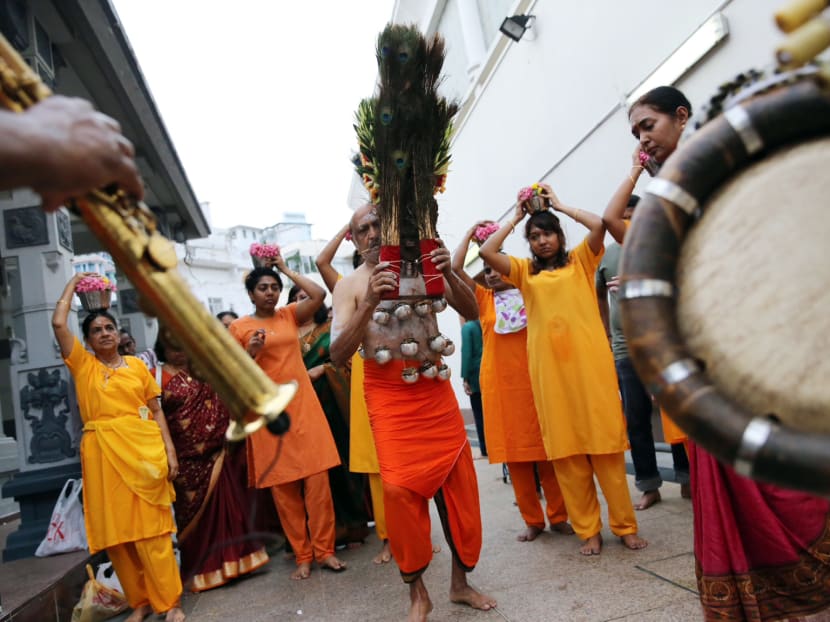Authorities relax rules for this year’s Thaipusam after feedback from Hindu community
SINGAPORE — After taking in feedback from the Hindu community, the authorities have decided to relax the rules governing the annual Thaipusam procession to allow for an earlier start time for music to be played, as well increase the number of static points where music can be played.
SINGAPORE — After taking in feedback from the Hindu community, the authorities have decided to relax the rules governing the annual Thaipusam procession to allow for an earlier start time for music to be played, as well increase the number of static points where music can be played.
Devotees are also allowed to play a wider range of musical instruments.
This year, devotees can look forward to playing their music from 7am to 10.30pm, starting an hour earlier from the previous years, said the Singapore Police Force (SPF) in response to queries from TODAY.
According to a section of Thaipusam.sg that details the rules for this year’s festival on Jan 20 and 21, there will be 35 static music points along the festival route — an increase from last year’s 23.
In addition, two live music points for the urumi melam will be set up at Short Street and Bras Basah Green, while another for the nadaswaram and thavil instruments will be located at Hastings Road.
Musicians are also allowed to play additional instruments: The ganjira and one of either a thavil, dhol or khol.
Amplification devices are still not allowed.
The SPF said that the new provisions were introduced in response to “specific feedback received by the Hindu Endowment Board (HEB)”.
“The Police have been working closely with the HEB to further facilitate Thaipusam over the years, taking into consideration the past conduct of participants and whether they adhere to the rules, and cause law and order or safety problems, or disturb residents and the general public,” it said.
When contacted, the HEB said the Board and the community appreciate the new provisions by the authorities.
Last year, at a post-Thaipusam dialogue, Law and Home Affairs Minister K Shanmugam said he was prepared to relook restrictions on live music along the procession, including allowing registered volunteer musicians to play, and allowing more live music points for future Thaipusam processions.
The ban on the playing of musical instruments during Thaipusam dated back to 1973 due to fights between rival groups, but was relaxed in late-2015.
Since 2016, live music was allowed at the festival, at three live music points along the procession route.
Mr Amar Ziaquat, who initiated a movement to lift the ban on the use of musical instruments in 2015, felt the easing of restrictions was a “good move” by the Government and the HEB.
In 2015, he started the Speak Up For Thaipusam Facebook page which “voiced the opinions of all Hindus” regarding the festival, and also held several discussions with the HEB about it.
“After many years the board and Government gave leeway to the Hindu community, and all of us are happy with the move and will also look forward to this year’s Thaipusam event,” said Mr Amar, who will be helping out with crowd control this year.
The managing director of AZDS Consultancy & Debt Enforcement Agency said that music is “very important” to the devotees, especially kavadi bearers who have to bear the weight of huge wood and steel structures pierced into their skin.
The religious hymns and chantings, accompanied by the instruments, help to calm their minds throughout the journey, he said.
Mr Amar hopes that the restrictions can be further eased in the future, such as extending the time for the last kavadi to leave the temple and having even more music points along the route.
The Thaipusam.sg website states that kavadi bearers must leave the Sri Srinivasa Perumal temple by 5pm and reach Sri Thendayuthapani temple by 11pm.
“Any changes made in future with regard to this will actually bring in more devotees, as well as other Singaporeans and tourists to watch the religious event.”
For now, it is an improvement for the Hindu community which he is grateful for.
“Even though small changes have been made, to us Hindus, it’s actually a great deal.”












